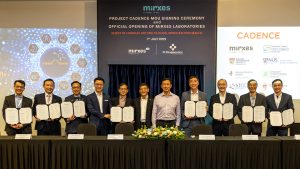Scientists begin work on a multi-cancer screening tool
Published: 07 Jul 2022

Cancer is the second most common cause of death worldwide and the leading cause of death in Singapore. 1 in 4 Singaporeans will develop cancer in their lifetime. Early cancer detection allows the opportunity to identify treatable tumours and decrease mortality rates. This underscores the importance of early detection through screening. However, certain barriers stand in the way of fast, accurate and non-invasive screening.
Witnessed by Guest-of-Honour, Mr. Ong Ye Kung, Minister for Health, a Memorandum of Understanding (MOU) was signed by MiRXES, the Yong Loo Lin School of Medicine, National University of Singapore (NUS Medicine), National Cancer Centre Singapore, Nanyang Technological University, Singapore, National University Hospital, Singapore General Hospital, Singapore Translational Cancer Consortium, and Tan Tock Seng Hospital, to launch Project CADENCE (CAncer Detected Early caN be CurEd) on 7 July 2022.
The project is the world’s first large-scale clinical research project for the discovery and validation of novel combinations blood-borne circulating microRNA (miRNA) and DNA methylation biomarkers that will lead to the development of a multi-cancer early detection test for up to nine high incidence and high mortality cancers, including lung, breast, colorectal, liver, stomach (gastric), esophageal, ovarian, pancreatic, and prostate cancers.
The MOU represents a new public-private partnership where Project CADENCE, a global effort championed by clinician-scientists from Singapore’s institutes of higher learning (IHLs) and public healthcare institutions (PHIs) represented by all three healthcare clusters, and powered by MiRXES, aims to address the rising cancer incidence rate and economic impact in Singapore and globally through early detection.
Professor Yeoh Khay Guan, Lead Principal Investigator for the project said, “Project CADENCE combines the efforts of cancer experts from all three healthcare clusters in Singapore with MiRXES’ cutting edge nucleic acid technology in a national effort to address an unmet need. Success in this venture would produce a game changer and a major breakthrough, a first of its kind blood test that can accurately detect early cancers and save many lives.” He is also Irene Tan Liang Kheng Professor in Medicine and Oncology, Department of Medicine, NUS Medicine, and Senior Consultant, Division of Gastroenterology & Hepatology, National University Hospital.
Project CADENCE comprises two phases. First, the biomarker discovery and test development phase between 2022 and 2024 will seek to surpass existing blood-based cancer biomarkers with more superior clinical performance in sensitivity and specificity. To identify novel combinations of miRNA and DNA methylation biomarkers to achieve better performance than existing tests, this phase will involve high-throughput, in-depth multi-omics analysis of the blood miRNA and DNA signatures of 12,000 individuals. The resulting cancer biomarkers will then be prototyped into a blood based multi-cancer early detection (MCED) test, under strict analytical and clinical validations by laboratory partners in A*STAR and the PHIs.
Implementation and clinical utility will take place in the second phase from 2024, with the goal of optimising large-scale clinical implementation workflow and demonstrate the utility of a MCED test in shifting today’s late stage cancer diagnosis to earlier stages. The second phase could see a longitudinal population cohort of more than 100,000 individuals including both average-risk and high-risk individuals.
Project CADENCE will receive an investment of an estimated S$50 million and more by MiRXES over a three-year period, with substantial in-kind contributions from the IHLs and PHIs. This research is expected to recruit more than 12,000 individuals including healthy average-risk individuals, high-risk individuals, patients with benign conditions, and newly diagnosed, treatment native cancer patients, and produce a significant number of intellectual property rights created on single- and multi-cancer biomarkers and test kits. The initiative will fortify Singapore’s leadership position in molecular cancer early detection solutions. The project will also see the creation of more than 80 new positions in research, manufacturing, and data science over the next three years.
News Coverage

